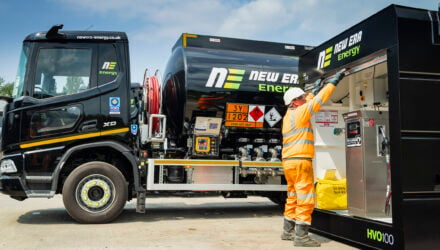Efforts made to safeguard mobile workers by Severn Trent Services, which include using technology from MICHELIN Connected Fleet across its van fleet, proved vital in delivering rapid aid to a stricken colleague.
One of Severn Trent Services’ long-running contracts is the provision of water and waste services to the Ministry of Defence (MoD) estate. This comprises multiple locations and covers a large geographic footprint across England.
To service this and other workstreams, Severn Trent Services operates a 177-strong van fleet, often manned by lone workers, alongside a selection of specialist vehicles.
Lauren James, Business Support Manager at Severn Trent Services, says: “Our field technicians work around the clock and in all conditions, with their vehicles serving as mobile offices. They cover considerable distances and ensuring that they are as safe as they can be while doing so, with modern, well-maintained vehicles and backup if required, is paramount.
“Having MICHELIN Connected Fleet facilitating digital walkaround checks before each journey, supplying driver performance and location data about the fleet, and providing a crucial emergency alert function if an incident does occur, is integral to our ability to meet this commitment.”
One of the company’s mobile field technicians put these systems to the test when travelling to an MoD location in rural Kent. Unexpectedly his van left the A-road it was using and crashed, obscured, in a hedgerow with the driver trapped inside and unresponsive.
However, as part of the MICHELIN Connected Fleet telematics package, each vehicle is fitted with an accelerometer to detect events such as harsh braking or in this case, to trigger the Incident Management function when a specified G-force limit is breached, such as in a crash.
This saw the system automatically alert the Severn Trent Services’ control room that there had been an incident that needed attention. As part of the alert process, a GPS and a digital map reference of the van’s location was immediately provided.
The control room’s subsequent calls to the driver established that there had been a crash and proved successful in rousing him from his semi-conscious state. This allowed for a quick assessment to be made, and an urgent request for emergency services assistance to be sent. The call handler remained on the line to keep the driver talking while help arrived.
The vehicle was so well hidden in the hedgerow that the driver had to be asked to honk his horn when the emergency services arrived at the supplied coordinates, suggesting discovery by passing traffic would have been unlikely. Thanks to the timely intervention, the driver made a full recovery.
“I think this has served to re-educate some of the business about the use of telematics and tracking. Previously some viewed it as intrusive but the incident, no matter how rare, reassured our workers that we take their safety seriously and that should the worst happen, we’re able to help them,” adds James.
As well as undertaking regular driver feedback and coaching to improve on road performance, Severn Trent Services has used the supplied fleet management tools to analyse and reduce engine idling by 30% across its van fleet between December 2023 and December 2024. As part of its sustainability goals, the service provider is also using MICHELIN Connected Fleet’s Electric Vehicle transition tool to identify where zero tailpipe emission vehicles would make suitable replacements for ICE-powered units.









